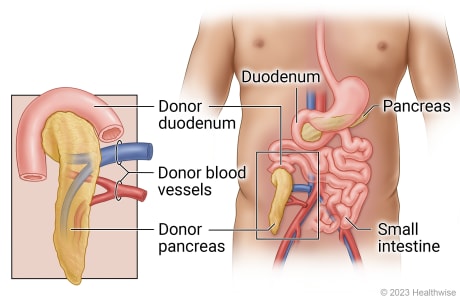Pancreas transplant: Overview
A pancreas transplant is surgery to give you a healthy pancreas. It may be combined with a kidney transplant if you also have kidney failure. The new organs come from a person (donor) who is deceased.
Before the transplant, you'll have many tests. These include tests to see how well the donor pancreas matches your tissue type and blood type.
During surgery, the doctor makes a cut (incision) in the middle of your belly. The donor pancreas is connected to your small intestine or your bladder so that digestive juices from the pancreas can drain. A small section of the donor's small intestine (duodenum) is also transplanted for that purpose. The doctor then connects the blood vessels of the donor organ to your blood vessels. Your own pancreas may still help with digestion. It will be left in your body unless it's causing problems. The doctor closes the incision with stitches or staples.
Why is a pancreas transplant done?
You may need a transplant if your pancreas doesn't work as it should. This is usually because of type 1 diabetes. But it may also be due to chronic pancreatitis or an injury to the pancreas.
Pancreas transplant

During a pancreas transplant, the diseased pancreas is usually left in place. The donated pancreas is placed in the front part of the belly and connected to the blood vessels of the lower belly. It is connected to your small intestine or your bladder so the digestive juices from the pancreas can drain. A small section of the donor's small intestine (the duodenum) is also transplanted for that purpose.
After a pancreas transplant: When to call
Call 911 anytime you think you may need emergency care. For example, call if:
- You passed out (lost consciousness).
- You have severe trouble breathing.
- You have sudden chest pain and shortness of breath, or you cough up blood.
- You have severe pain in your belly.
Call your doctor now or seek immediate medical care if:
- You have pain that does not get better after you take pain medicine.
- You have nausea or vomiting or cannot keep down fluids or your anti-rejection medicines.
- You have loose stitches, or your incision comes open.
- You are bleeding from the incision.
- You have symptoms of a urinary infection (if you also had a kidney transplant). For example:
- You have blood or pus in your urine.
- You have pain in your back just below your rib cage. This is called flank pain.
- You have a fever, chills, or body aches.
- It hurts to urinate.
- You have groin or belly pain.
- You have signs of infection, such as:
- Increased pain, swelling, warmth, or redness.
- Red streaks leading from the incision.
- Pus draining from the incision.
- A fever.
- You have trouble passing urine or stool.
- You have pain or swelling in your belly.
- You have signs of a blood clot, such as:
- Pain in your calf, back of the knee, thigh, or groin.
- Redness and swelling in your leg or groin.
- You have a weight gain of more than 2 pounds in 1 day.
- You have any problems with your anti-rejection medicine.
- You have trouble controlling your blood sugar.
Watch closely for changes in your health, and be sure to contact your doctor if:
- You do not have a bowel movement after taking a laxative.
©2011-2026 Healthwise, Incorporated
